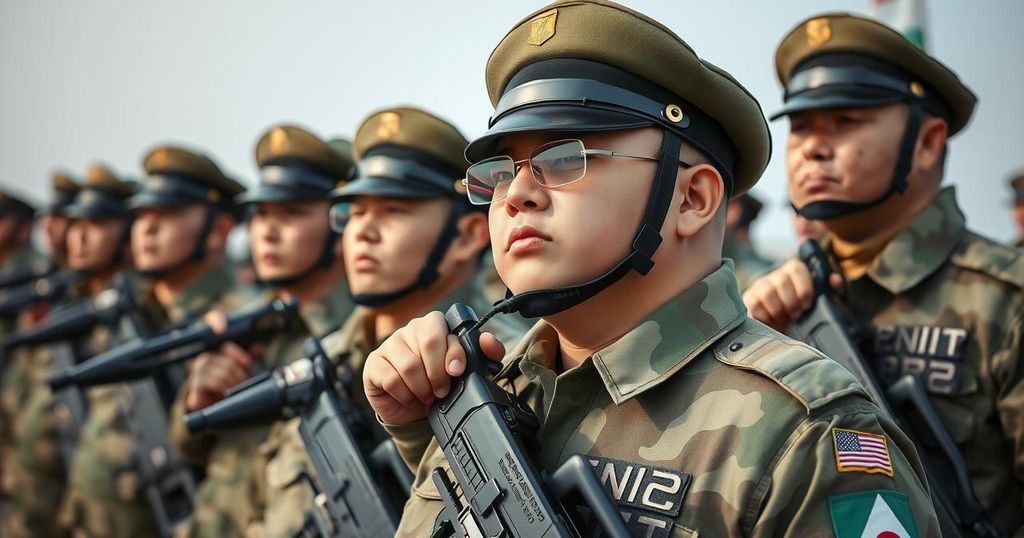Insights from North Korean Defectors on Troops Fighting for Russia in Ukraine
Former North Korean soldiers recount their experiences with severe malnutrition and rigorous training, providing insights into the troops now supporting Russia in Ukraine. Although these soldiers are part of the elite Storm Corps, they face significant adaptation challenges and communication barriers. Despite their underprivileged conditions, their loyalty and indoctrination may make them formidable participants in the conflict.
A former North Korean soldier named Haneul vividly recalls the persistent hunger he experienced during his military service, which caused him to lose considerable weight upon enlistment. Alongside fellow soldiers, he endured severe malnutrition that required temporary recovery interventions. Soldiers deployed as frontline guards later received rations of rice, although much of it was siphoned away by rear units, leading to food shortages even among relatively well-fed troops. In 2012, Haneul defected, a choice shaped by these harsh conditions, and his experiences, along with those of other defectors, provide insights into the dire state of North Korean troops now assisting Russia in its ongoing war with Ukraine.
Reports indicate that North Korea has dispatched approximately 11,000 troops to Russia to assist in reclaiming territories in Ukraine, with notable losses already recorded. South Korean intelligence describes much of the deployed contingent as part of the elite Storm Corps, noted for their high morale yet lacking a comprehensive understanding of modern combat tactics. Lee Hyun Seung, a former instructor for North Korea’s special forces, remarked that candidates for the Storm Corps are typically more physically capable, but ongoing malnutrition undermines their training effectiveness.
Defectors underscore the sharp contrast between the reality of these soldiers and the glorified imagery presented by North Korean propaganda. Whereas training for these troops exists, involving survival skills and advanced martial arts, the necessity of drastic resource allocation towards missile development has impeded improvements in soldiers’ conditions. Additionally, defectors from different eras convey that the brutal conditions persist, observing a decline in food supplies throughout their service years.
The operational effectiveness of Storm Corps soldiers, trained for mountainous warfare, is uncertain in the context of the flat terrains of Kursk. Communication barriers complicate their integration into Russian forces further, with reports suggesting that ill-fated incidents have occurred due to misunderstandings amongst troops, revealing potential pitfalls in their deployment. Despite their struggles, defectors believe these soldiers exhibit unwavering loyalty to North Korea, a factor that may play a pivotal role on the battlefield and may lead them to fight more vehemently than Russian counterparts who may lack similar motivations.
The defectors caution against dismissing these soldiers as mere expendable units, noting their commitment and the influence of intense ideological indoctrination. The absence of prominent individuals among those deployed points to systematic sacrifices aimed at preserving the regime’s image abroad. While many of these soldiers may desire to serve abroad for the first time, defectors suggest that significant resistance to defection exists due to the prevailing culture of shame associated with surrender or capture. Proposals to encourage defection through psychological tactics will face substantial obstacles stemming from the deeply ingrained military ethos combating their inclinations to escape.
The article discusses the experiences and conditions faced by North Korean soldiers, particularly those now deployed alongside Russian forces in Ukraine. It draws on the testimonies of defectors to portray the challenging realities within the North Korean military, highlighting the impact of malnutrition, training efficacy, and ideological loyalty. Additionally, it emphasizes the operational challenges faced by these soldiers as they adapt to a different combat environment while maintaining unwavering allegiance to their home regime under Kim Jong Un. The insights provided offer a multifaceted perspective on the dynamics at play in this unique military collaboration.
In summary, the challenges and resiliency of North Korean soldiers deployed in support of Russia in Ukraine are multifaceted. Defectors reveal the stark realities of hunger and rigorous military indoctrination that shape these troops’ outlook and performance. While they may lack modern warfare experience and suffer from extensive hardships, their loyalty and commitment to their regime cannot be underestimated. These factors combined suggest that, despite their circumstances, these soldiers could potentially play a significant role in the conflict, bringing into question the long-term implications of their involvement for both North Korea and the combatants they are facing.
Original Source: www.bbc.com




Post Comment